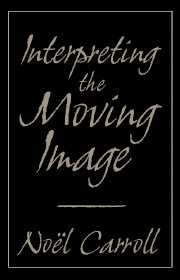Book contents
- Frontmatter
- Contents
- Foreword: Through Carroll's Looking Glass of Criticism
- Introduction
- 1 The Cabinet of Dr. Kracauer
- 2 Entr'acte, Paris and Dada
- 3 The Gold Rush
- 4 Keaton: Film Acting as Action
- 5 Buster Keaton, The General, and Visible Intelligibility
- 6 For God and Country
- 7 Lang, Pabst, and Sound
- 8 Notes on Dreyer's Vampyr
- 9 King Kong: Ape and Essence
- 10 Becky Sharp Takes Over
- 11 Interpreting Citizen Kane
- 12 The Moral Ecology of Melodrama: The Family Plot and Magnificent Obsession
- 13 Mind, Medium, and Metaphor in Harry Smith's Heaven and Earth Magic
- 14 Welles and Kafka
- 15 Nothing But a Man and The Cool World
- 16 Identity and Difference: From Ritual Symbolism to Condensation in Anger's Inauguration of the Pleasure Dome
- 17 Text of Light
- 18 Joan Jonas: Making the Image Visible
- 19 Introduction to Journeys from Berlin/1971
- 20 The Future of Allusion: Hollywood in the Seventies (and Beyond)
- 21 Back to Basics
- 22 Amy Taubin's Bag
- 23 Herzog, Presence, and Paradox
- 24 Film in the Age of Postmodernism
- Notes
- Index
Foreword: Through Carroll's Looking Glass of Criticism
Published online by Cambridge University Press: 05 June 2012
- Frontmatter
- Contents
- Foreword: Through Carroll's Looking Glass of Criticism
- Introduction
- 1 The Cabinet of Dr. Kracauer
- 2 Entr'acte, Paris and Dada
- 3 The Gold Rush
- 4 Keaton: Film Acting as Action
- 5 Buster Keaton, The General, and Visible Intelligibility
- 6 For God and Country
- 7 Lang, Pabst, and Sound
- 8 Notes on Dreyer's Vampyr
- 9 King Kong: Ape and Essence
- 10 Becky Sharp Takes Over
- 11 Interpreting Citizen Kane
- 12 The Moral Ecology of Melodrama: The Family Plot and Magnificent Obsession
- 13 Mind, Medium, and Metaphor in Harry Smith's Heaven and Earth Magic
- 14 Welles and Kafka
- 15 Nothing But a Man and The Cool World
- 16 Identity and Difference: From Ritual Symbolism to Condensation in Anger's Inauguration of the Pleasure Dome
- 17 Text of Light
- 18 Joan Jonas: Making the Image Visible
- 19 Introduction to Journeys from Berlin/1971
- 20 The Future of Allusion: Hollywood in the Seventies (and Beyond)
- 21 Back to Basics
- 22 Amy Taubin's Bag
- 23 Herzog, Presence, and Paradox
- 24 Film in the Age of Postmodernism
- Notes
- Index
Summary
“I meant by ‘impenetrability’ that we've had enough of that subject, and it would be just as well if you'd mention what you mean to do next, as I suppose you don't mean to stop here all the rest of your life.”
“That's a great deal to make one word mean,” Alice said in a thoughtful tone.
“When I make a word do a lot of work like that,” said Humpty Dumpty, “I always pay it extra.”
– Lewis Carroll, Through the Looking GlassIn a critique of the film theory of André Bazin that is both penetrating in its logic and devastating to Bazin's theoretical argument and yet seems somehow nearly irrelevant to what most of us would agree is the importance of Bazin to film studies, Noël Carroll proposes a distinction between film theory and film criticism. Redefining Bazin's theory of cinematic realism, Carroll claims it is best approached as an argument in favor of a particular film style rather than definition of the essence of cinema. Instead of a coherent argument about the nature of the film image, Bazin offers, as Carroll puts it, “an astute appreciation of an important stylistic shift.” Acknowledging that the weakness of Bazin's theoretical metalogic does not gainsay his deep insight into a stylistic change in film history, Carroll admits, with the sort of disarming candor that so often strikes one in his work, “What fails as theory may excel as criticism.”
- Type
- Chapter
- Information
- Interpreting the Moving Image , pp. xi - xviiiPublisher: Cambridge University PressPrint publication year: 1998
- 1
- Cited by



